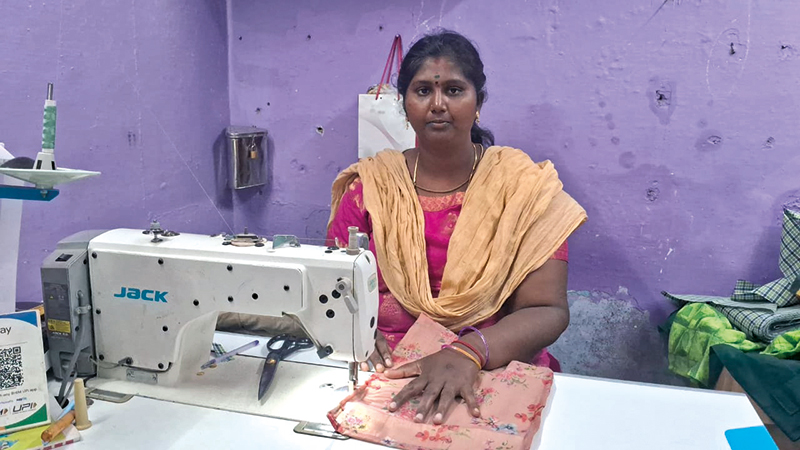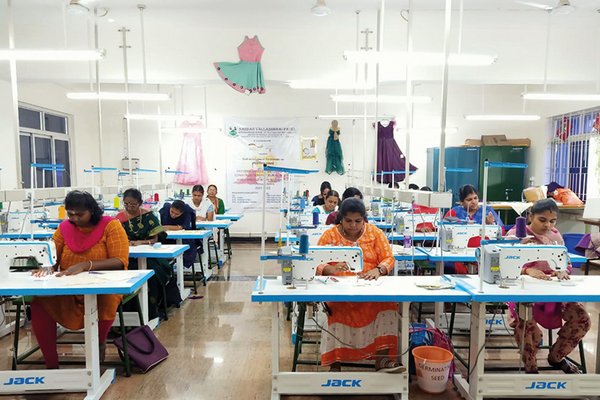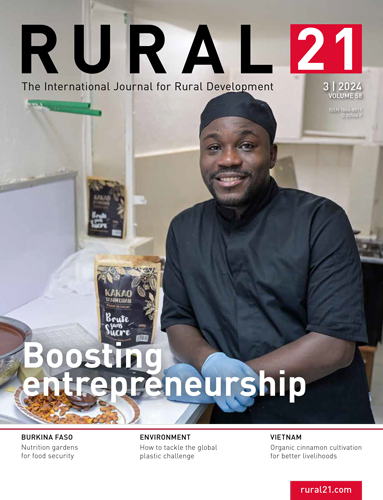 Download this article in magazine layout
Download this article in magazine layout
- Share this article
- Subscribe to our newsletter
Building rural capacities in India’s cotton supply chain – an opportunity for women’s empowerment
With a population of 1.4 billion people today, India is the world’s second largest country. More than half of the population work in the agriculture and agriculture-allied sectors and are thus a part of global supply chains. The country’s textile industry, which is largely cotton-based, is a significant contributor to this agricultural production. It is responsible for the livelihoods of about 45 million employees within the country and drives a large export market. Smallholder farmers and rural workers are a key part of this production system. They are also the most affected by poverty, the vagaries of climate change and structural inequalities, and contend with limited knowledge about sustainable farming and processing. It is here that the global development cooperation programme “Sustainability and Value Added in Agricultural Supply Chains” (AgriChains) comes in (see Box below). It works to increase sustainable cotton production in the country according to global standards, strengthen local processing capabilities, build capacities of stakeholders, pilot innovations and facilitate knowledge exchange among partners. This enables sustainable and transparent supply chains from shelf to field to be established via a system of backward linkages from consumers, along the supply chain to the producers.
The programme “Sustainability and Value Added in Agricultural Supply Chains” (AgriChains) is operational in 24 countries and 9 commodities world-wide. It is being implemented by Deutsche Gesellschaft für Internationale Zusammenarbeit (GIZ) on behalf of the German Federal Ministry for Economic Cooperation and Development (BMZ). In India, the programme is being run in close cooperation with the Indian Ministry of Textiles and several partners across industry, standards organisations, academia, civil society, and via multi-stakeholder partnerships. Over 266,000 farmers have been linked to companies that are committed to sustainable sourcing through the programme as of 2024.
Empowering women through rural micro-entrepreneurship
With its training and capacity-enhancement initiatives, the programme reaches different stakeholders in the sector, including textile education students, local artisans, cotton weavers, ginners, and spinners. Aimed at equipping them with industry-relevant skills and enhancing their employability, it also contributes to fostering a robust textile sector in the country, not just via individual economic empowerment but through the strengthening of the rural communities as well. A key aspect of this is to undertake activities empowering women through micro-entrepreneurship. One of the AgriChains initiatives contributing to this is the capacity-enhancement initiative “Knowledge, Values, & Education for Sustainable Development in Textiles”. It provides the participants with crucial skills in sustainable textile production. Training and refresher courses on pattern making, sewing and garment construction enable rural women in the Indian state of Tamil Nadu to generate stable income and contribute to their communities. Additionally, they receive exposure to state-of-the-art machinery and large-scale garment manufacturing facilities through field visits. During these visits, they can observe all stages of garment manufacturing right from pattern making and conceptualisation, sample creation, marking, cutting, trimming and accessory placement to sewing, finishing and the steps involved in quality checks as well. They are also given insights into the packaging and labelling functions in factories which prepare them to meet market demands and even start their own ventures.
Established by India’s Ministry of Textiles, the Sardar Vallabhbhai Patel International School of Textiles and Management (SVPISTM) in Coimbatore is the implementation and knowledge partner for this initiative. The institute undertakes several skills development programmes for rural communities, particularly women. As a national institution, it provides comprehensive education in textile management while focusing on industry-relevant skills. Through partnerships and practical training, it bridges the gap between education and industry needs.
A low-threshold programme
Their training programmes, which feature women trainers and coordinators and boast a reputation for safe environments, have seen a very positive uptake in the region. The school focuses on only very basic literacy and numeracy as entry requirements, ensuring that participants can grasp garment measurements and engage fully in the training. “Our hands-on training approach, which is 100 per cent practical from day one, is designed to be inclusive of women aged 40 to 60, regardless of their previous training, unlike other programmes,” explains M. Venkatalakshmi, Programme Co-ordinator at SVPISTM. “Over 50 per cent of all our batches include women from this age group.” She notes that an additional strength of the programme is that the school focuses on real-world skills like garment design and customisation, allowing participants to immediately start working on machines. Furthermore, the 15-day schedules include sessions on loans, the available government funding schemes, portals to access them and related themes. According to M. Venkatalakshmi, many women have also been part of self-help groups and they have expanded their business, bought small machinery, etc. and share their experiences regularly. “Our participants keep coming back for conferences on sustainability, on techniques, etc. and keep their skills fresh,” she says. To further enhance capacities of other interested participants, English content is translated into Tamil. The institute advertises its training programmes in local print media as well as via its networks in Tamil Nadu, which enable women across several age groups and education levels to enquire and register for the training. Additionally, word-of-mouth through previous successful participants remains a powerful motivator in remote rural regions. “Several women come directly to the institute and request assistance with applications, which we are happy to provide,” M. Venkatalakshmi notes.
A training participant shares her experience
M. Priyanka, aged 32, hails from Ellaithottam, a remote village near Coimbatore. Her family, like many in the area, relies on farming for their livelihood, facing the inherent uncertainties of weather and market fluctuations. With limited education and no formal vocational training, Priyanka’s aspirations to contribute to her family’s income seemed out of reach. With her family’s encouragement, she enrolled in a course of the free skill-enhancement programme organised by AgriChains India and implemented by the SVPISTM.
The training covered various aspects of tailoring, including advanced sewing techniques, pattern making, and garment construction. Importantly, the programme also imparted crucial business skills such as order management, pricing strategies, and customer relations. After returning to Ellaithottam, Priyanka established a small tailoring business from her home. Her reputation for quality work quickly spread, leading to a steady increase in demand for her services. She shares:
“My growing income has significantly improved our family’s economic stability. The consistent earnings from my tailoring work complement the seasonal nature of our farming income, providing our whole family with a more secure financial foundation. It has also inspired other women to pursue similar opportunities. I now mentor a group of local women, sharing my knowledge and experiences to help them establish their own micro-enterprises.”
Like many other participants in the programme, Priyanka stays in regular contact with the institute and trainers to keep her skills up to date, discuss her business and refer others who may be interested in participating in these processes.
Priyanka completing a tailoring order for a client.
Photo: SVPISTM
With eight cycles (batches) of successful participants so far, the pattern-making training is helping rural women take small but certain strides towards a more empowered life. Through participating in the programme, over 120 women who previously had limited opportunities for income generation are now producing high-quality garments. This complements their family’s seasonal farming income, while also providing them with a source of financial independence.
One of these women is M. Priyanka (see Box). Her story underscores the importance of empowering rural women through education and vocational training, demonstrating how such initiatives can foster sustainable development and resilience in rural areas, while being catalysts of increased decision-making for women by opening new avenues for them.
Vikash Sinha is Project Manager of the AgriChains India Hub at GIZ. He works on sustainable cotton, tea, spices and coffee supply chains, with a strong focus on building industry partnerships, digitalisation, and gender transformation.
Rajasindhura Aravalli is a Knowledge Management and Communications Officer at GIZ. She is a policy researcher and writer with a focus on sustainability standards and natural resource management.
Contact: rajasindhura.aravalli@giz.de




Add a comment
Be the First to Comment